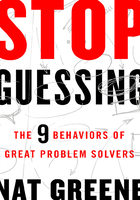
WHY PEOPLE CAN’T SOLVE HARD PROBLEMS
Most people guess when they try to solve problems. You may not believe that you do, but any time you come up with a list of possible root causes, or a “hypothesis,” or anything that you need to test before you are certain it’s the root cause, you are guessing. The good news is that most problems are pretty easy: We solve them all the time, and we may not even be aware that we’re solving problems. Humanity got to 7 billion people by solving most of the problems it ran into—some of them hard, many of them easy. Conventional, guess-based approaches will work fine for these easy problems, but they’ll run into trouble with hard ones.
Here’s where most folks go wrong: Often, people use the same guessing methods they apply to easy problems to try to tackle hard ones, and they get steamrolled. It’s like sending your high school basketball team up against the Michael Jordan-era Chicago Bulls—it’s just not going to work, and you’re going to have to take your game to the next level if you want to solve them. I want to help you understand the behaviors you need to play like an all-star problem-solver.
There are some very simple problem-solving methods, such as Five Whys, that will help you to guess with greater focus. There are also some others that have pages upon pages of steps to follow, and there are many books peddling many of these methods. But solving hard problems is about far more than having a good problem-solving method. Imagine trying to walk into surgery armed only with a handbook, one that is designed to guide you through any kind of surgery with a single step-by-step approach. It’s obvious in any other context: You need to know how to use your brain and make decisions in the field in order to be successful at surgery.
There are also some others that have pages upon pages of steps to follow, and there are many books peddling many of these methods. But solving hard problems is about far more than having a good problem-solving method. Imagine trying to walk into surgery armed only with a handbook, one that is designed to guide you through any kind of surgery with a single step-by-step approach. It’s obvious in any other context: You need to know how to use your brain and make decisions in the field in order to be successful at surgery.
Likewise, when solving hard problems you need to learn how to draw on the right behaviors in the right circumstances, and I have found that most people are never taught about great problem-solving behaviors before they’re expected to solve hard problems. It’s really no mystery why people struggle so much with it.
With the right skills and behaviors, we can solve hard personal problems such as chronic illnesses, bad habits, and stubborn extra weight. We can solve technical problems at home and at work, from glitches in your car to outages at massive refineries. As a society, we can solve global systemic problems, such as many diseases, economic risks, violence, and environmental contamination. Our lives and the world can become a much better place.
Without a doubt, many of the hardest problems facing the world require more than just a few smart folks to understand the root cause behind what’s solving them. Some will require great scientific innovations or discoveries; some will require the mustering of significant resources. I have been solving hard problems for a long time and still shrug my shoulders whenever somebody asks me how to create peace in the Middle East. But every unsolved problem is bottlenecked by not understanding the root cause at a fundamental level, and every single one needs some great problem-solvers to crack it.
To become a great problem-solver, you’ll need to practice these behaviors on easier problems, using a structured method to guide you and, ideally, a coach to provide feedback and a sounding board. But the most important step to take is to get out there and start solving problems.
What hard problems are you living with? Which ones have you tried and failed to solve? Where have you given up or worked around a problem at great expense? Now is the time to do something about that: We’re going to go solve some hard problems.